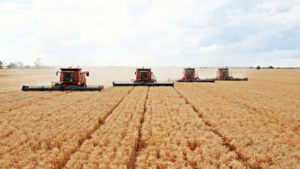Moo organic milk needed, says boss of Australia’s newest infant formula maker

Pic: Stevica Mrdja / EyeEm / EyeEm via Getty Images
Australia’s newest organic milk producer, Australia Dairy Farms, believes organic milk is the next big trend.
Aus Dairy Farms shares (ASX:AHF) more than doubled from 11c to 25c on Monday after the group announced it was converting its six Victorian farms to organic production — and moving into organic infant formula.
The shares closed up 68 per cent at 18.5c.
Aus Dairy is entering a highly established market with players including Clover Corp (which makes a formula additive), Bellamy’s, Wattle Health, Bub’s, Synlait, and A2.
But boss Peter Skene sees organic production as a differentiator — and he believes the next five to ten years will be a boom-time for organic milk producers.
Once Aus Dairy Farms completes its organic conversion — in one to three years — it will produce up to 16 million litres of the white stuff a year.
That will make it the second-biggest organic milk producer in Australia.
Right now the organic milk market in this country is tiny. It accounts for about 40 million litres of the 9 billion litre a year Australian milk industry.
The Organic Dairy Farmers cooperative produces the most at 21 million litres a year, and Paris Farms — bought by Longtable (ASX:LON) for $34 million last year — makes 12 million organic litres. (Longtable has ambitions to increase this to 30 million litres).
Mr Skene says the sector is now big enough to be interesting to a company of their size, but too small to draw the attention of big milk producers like Fonterra and Murray Goulburn yet.
He says organic milk prices tend to be more consistent over time — unlike the brutal boom and bust cycle that grips the rest of the industry — because there’s not enough to go around yet.
Big swings in oversupply and undersupply do not happen.
The people demand organic
While figures are hard to come by, organic may finally be making inroads into more Australians’ shopping baskets.
A report last year from Australian Organic said the broader organics industry will be worth $2 billion this year, and dairy products were the most purchased organic good.
> Bookmark this link for small cap breaking news
> Discuss small cap news in our Facebook group
> Follow us on Facebook or Twitter
> Subscribe to our daily newsletter
To get an idea of what that looks like on the ASX, market darling Bellamy’s (ASX:BAL) controls 99 per cent of the Australian organic infant formula market.
But even it says it buys “the majority” of its organic milk from Europe because not enough is made in Australia.
The China conundrum
Aus Dairy (ASX:AHF) is also using the dairy farm conversion to move into baby formula.
In spite of Bellamy’s dominance over the Australian organic baby milk powder market, Mr Skene believes the country is big enough for another large player.
Aus Dairy will first focus on Australia, followed by a move into South-East Asia — countries like Vietnam, Indonesia and the Philippines, rather than directly hitting up China.
China is the known formula for success in infant milk.
Bellamy’s made it big first.
Now others like Jatenergy (ASX:JAT), Bub’s Australia (ASX:BUB), Bioxyne (ASX:BXN), New Zealand’s Synlait (ASX:SML) and Wattle Health (ASX:WHA) are striding in to satiate demand amplified by food safety disasters such as the tainted baby formula scandal in 2008, which killed six infants and made many more babies ill.
China can be an unforgiving mistress, as Bellamy’s found on December 2, 2016, when its share price plummeted after the country issued import rule changes that came into force this year.
Then in July last year the Certification and Accreditation Administration of the People’s Republic of China (CNCA) suspended the Chinese export licence of Bellamy’s Camperdown Powder canning factory in the Melbourne suburb of Braeside, due to a complaint about quality and record keeping.
The licence was reinstated two weeks later.
More recently, Jatenergy was suspended from the ASX over whether its proposed acquisition Golden Koala had permission to sell infant formula into China: it did as of January, but a rule change means that it now doesn’t and needs to apply to the new regulator, the China Food and Drug Administration (CFDA).
UNLOCK INSIGHTS
Discover the untold stories of emerging ASX stocks.
Daily news and expert analysis, it's free to subscribe.
By proceeding, you confirm you understand that we handle personal information in accordance with our Privacy Policy.








